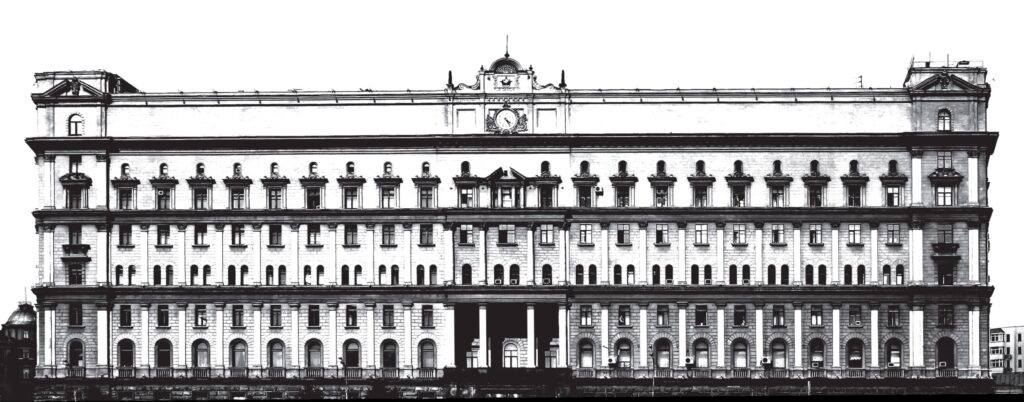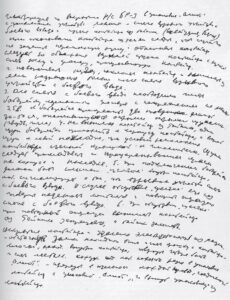| Previous page | Back to exhibition’s homepage | Next page |
|
|
|
|
| Vassili Mitrokhin (1922-2004) is een belangrijke Russische archivaris werkzaam voor de KGB maar besluit te vluchten naar het Westen. | Vassili Mitrokhin (1922-2004) was an important archivist for the KGB who decided to seek shelter in the West. | Vassili Mitrokhine (1922-2004) est un archiviste important du KGB qui a décidé de se réfugier en Europe de l’Ouest. |
| In 1972 is Mitrokhin de projectleider voor de verhuizing van het archief van Lubyanka naar het nieuwe hoofdkwartier in Jasenevo. Mitrokhin begint echter steeds meer en meer te twijfelen aan de geloofwaardigheid van de buitenlandse politiek van zijn land. Hij begint dan ook kopieën te nemen van de archiefdocumenten die hij in handen krijgt. | In 1972, he was responsible for supervising the relocation of the Lubyanka archives to the new headquarters located in Jasenevo. But Mitrokhin started to cast doubts on the credibility of the foreign policy of his country. He therefore decided to make copies of archives that passed into his hands. | En 1972, il est chargé de superviser le déménagement des archives de Lubyanka vers le nouveau quartier général situé à Jasenevo. Mitrokhine émet de sérieux doutes quant à la crédibilité de la politique étrangère menée par son pays. Il décide donc d’effectuer des copies d’archives qui passent entre ses mains. |

Lubyanka
KGB Headquarter – KGB Hoofdkwartier – Quartier-général KGB
| In 1992 loopt hij over naar het Westen en neemt ongeveer 20.000 pagina’s mee die hij in het geheim heeft gekopieerd. | In 1992, he fled to the West and took with him about 20.000 pages that he had managed to copy. | En 1992, il s’enfuit vers l’Ouest et emporte avec lui environ 20.000 pages qu’il est parvenu à copier secrètement. |
| De Britse geheime dienst is geïnteresseerd in zijn verhaal en engageert hem. | The British secret service got interested in his story and decided to hire him. | Le service secret britannique s’intéresse à son histoire et l’engage. |
| Samen met Christopher Andrew publiceert hij delen van zijn archief in “The Mithrokin Archive”. | In collaboration with Christopher Andrew, he published several parts of his archives under the title “The Mitrokhin Archive”. | En collaboration avec Christopher Andrew, il publie des pans entiers de ses archives sous le nom “The Mitrokhin Archive”. |
| De gevolgen van zijn vlucht zijn enorm: door zijn archiefdocumenten worden geheime agenten van de KGB in de Verenigde Staten en Engeland ontmaskerd en worden opslagplaatsen met communicatie- en encryptieapparatuur blootgelegd in Europa. | The consequences of his escape were huge: his archives allowed to expose secret agents of the KGB in the USA and in England. Moreover, warehouses with communication and encryption material were discovered in Europe. | Les conséquences de sa fuite sont énormes : ses archives permettent de démasquer des agents secrets du KGB postés aux États-Unis et en Angleterre. De plus, des entrepôts d’appareils de communication et de codage sont également découverts en Europe. |

Kopie van de instructies voor het onschadelijk maken van Molnija explosieven diezich in veel geheime bergplaatsen bevonden. Copy of the instructions for defusing Molnija explosives that were in many secret hiding. Copie des instructions pour désamorcer les explosifs Molnija qui étaient dans de nombreuses cachettes.
| Zelfs in België vindt men Sovjet uitzendapparatuur dankzij de nauwkeurige aantekeningen van de archivaris. | Thanks to the archivist’s meticulousness, Soviet transmission equipment was even found in Belgium. | La minutie de l’archiviste a même permis de trouver du matériel de transmission soviétique en Belgique. |
| Previous page | Back to exhibition’s homepage | Next page |